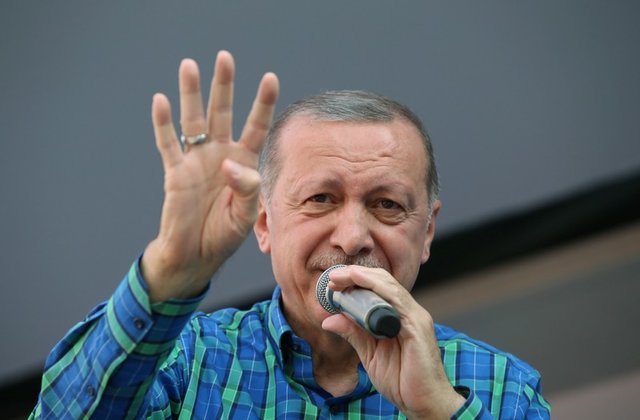Former Iraqi Prime Minister Nuri al-Maliki fulfilled his life-long goal of wresting power from the country’s minority Sunnis after the fall of Saddam Hussein but his drive to entrench Shi’ite dominance proved his downfall.
Blamed for the widespread corruption and divisive policies that contributed to the collapse of the Iraqi military and the rise of Islamic State, Maliki lost the premiership to fellow Dawa Party member Haider al-Abadi after a 2014 election.
Now, after four years sidelined as one of three largely ceremonial vice-presidents, Maliki is taking on Abadi in a May 12 election in a bid to win a third term as prime minister, and is posing again as Iraq’s Shi’ite champion.
Posters of Grand Ayatollah Mohammed Baqir al-Sadr who was executed by Saddam in 1980 fly at Maliki’s rallies, the dominant color of his campaign banners is the green of Islam and he is proposing to do away with the power-sharing formula that has ensured government roles for the dominant non-Shi’ite groups.
Sentenced to death under Saddam for being part of the outlawed Shi’ite Islamic Dawa Party, Maliki spent nearly a quarter of century in exile mainly in Syria and Iran, continually agitating for the dictator’s downfall.
After returning in 2003, Maliki joined Iraq’s interim government and became prime minister in 2006, establishing a reputation as a shrewd political operator and the Shi’ite leader who pulled Iraq back from the brink of civil war.
Maliki’s supporters praise him for signing Saddam’s death warrant in 2006 and for refusing to allow U.S. forces to stay in Iraq beyond 2011.
But during eight years in office, Maliki was also perceived as an inveterate sectarian who alienated the minority Sunnis and Kurds by shutting them out of key security positions and undermining power-sharing.
“When he became prime minister, he continued to function as an underground Dawa operative. He put in place shadow Dawa cells in each ministry reporting directly to him, and not the minister,” said a non-Shi’ite who served in Maliki’s cabinet.
“It wouldn’t be far-fetched to say that he created a parallel government and parallel security services reporting directly to him,” the former minister told Reuters.
Responding to accusations Maliki ran a parallel government, his media adviser, Abbas al-Musawi, said the former prime minister was at times forced to launch initiatives directly to boost the economy when he felt ministers from other groups were delaying or obstructing the work of government.
Blamed for letting Islamic State seize a third of Iraq in 2014, Maliki was blocked from winning a third term by Iraq’s top Shi’ite cleric, Grand Ayatollah Ali al-Sistani, opening the door for Abadi to become prime minister.
‘POLITICAL MAJORITY’
On the face of it, Maliki’s campaign call for a multi-ethnic “political majority” government to make the administration more efficient and cohesive could be seen as a break with his past.
Maliki is proposing to replace the system whereby the cabinet must reflect the parliamentary representation of political parties with a multi-ethnic governing majority and a multi-ethnic opposition minority.
But non-Shi’ite politicians fear the plan could keep the main non-Shi’ite groups out of government and reduce their influence, in contrast to the more inclusive policies of Abadi.
“Shi’ite religious parties have been controlling the key positions of the state, public administrations and security services since 2003. Having a political majority rule under these conditions will remove all the checks and balances non-Shi’ite parties have,” said Jaber al-Jaberi, a Sunni MP.
Opponents say the proposed system would, in practice, allow a prime minister to chose Kurd or Sunni ministers who are not representatives of the main Kurdish or Sunni parties, as long as they were qualified and agreed on a common program.
“The claims that there is a deep state controlled by the Dawa is a big lie,” said Saad al-Muttalibi, a lawmaker from Maliki’s group in parliament.
“The previous (Maliki) governments were partnership cabinets and the political forces that took part in them share the credit of success and the blame of failure,” he said.
Maliki’s followers see his removal in 2014 as a conspiracy because he championed Shi’ite interests in Iraq and the region.
“He is a strong leader, he is not afraid of confrontation,” said Mohamed Ghabbar, a student in the Shi’ite holy city of Kerbala, south of the capital Baghdad.
In Syria, Maliki sided with Shi’ite neighbor Iran and Bashar al-Assad in the civil war pitting the Syrian president against predominantly Sunni opponents backed by Saudi Arabia, Qatar and Turkey.
Like many Iraqi Shi’ite leaders Maliki is closely tied to Iran, where he built relationships during his exile.
In his election campaign, Maliki continues to advocate an anti-Saudi line, implicitly criticizing Abadi for rebuilding bridges with Riyadh and other Sunni capitals.
“I had told these countries that I won’t allow the regime in Syria to fall,” he said in an April 24 interview to Al Mayadeen, a Lebanese TV channel close to Assad, who belongs to the Alawite sect which is an offshoot of Shi’ism.
“Saudi Arabia failed (in Syria) and it is trying now to bring Iraq to the Saudi alliance. Iraq can’t be part of this alliance,” he said, in an apparent reference to a conference in Kuwait in February to raise funds for Abadi to rebuild Iraq.
As the leader of the Dawa Party, Maliki will command a solid base of Shi’ite support in the election, especially from religious Shi’ites wary of power-sharing.
But this time round, the Shi’ite vote looks set to be split between three frontrunners: Abadi, Maliki and another ally of Iran, militia leader Hadi al-Amiri, whose stature and popularity rose after he commanded the fight against Islamic State.
If no clear winner emerges, Maliki will have to call on all his negotiating skills again to secure a governing alliance, or risk being sidelined once more.


